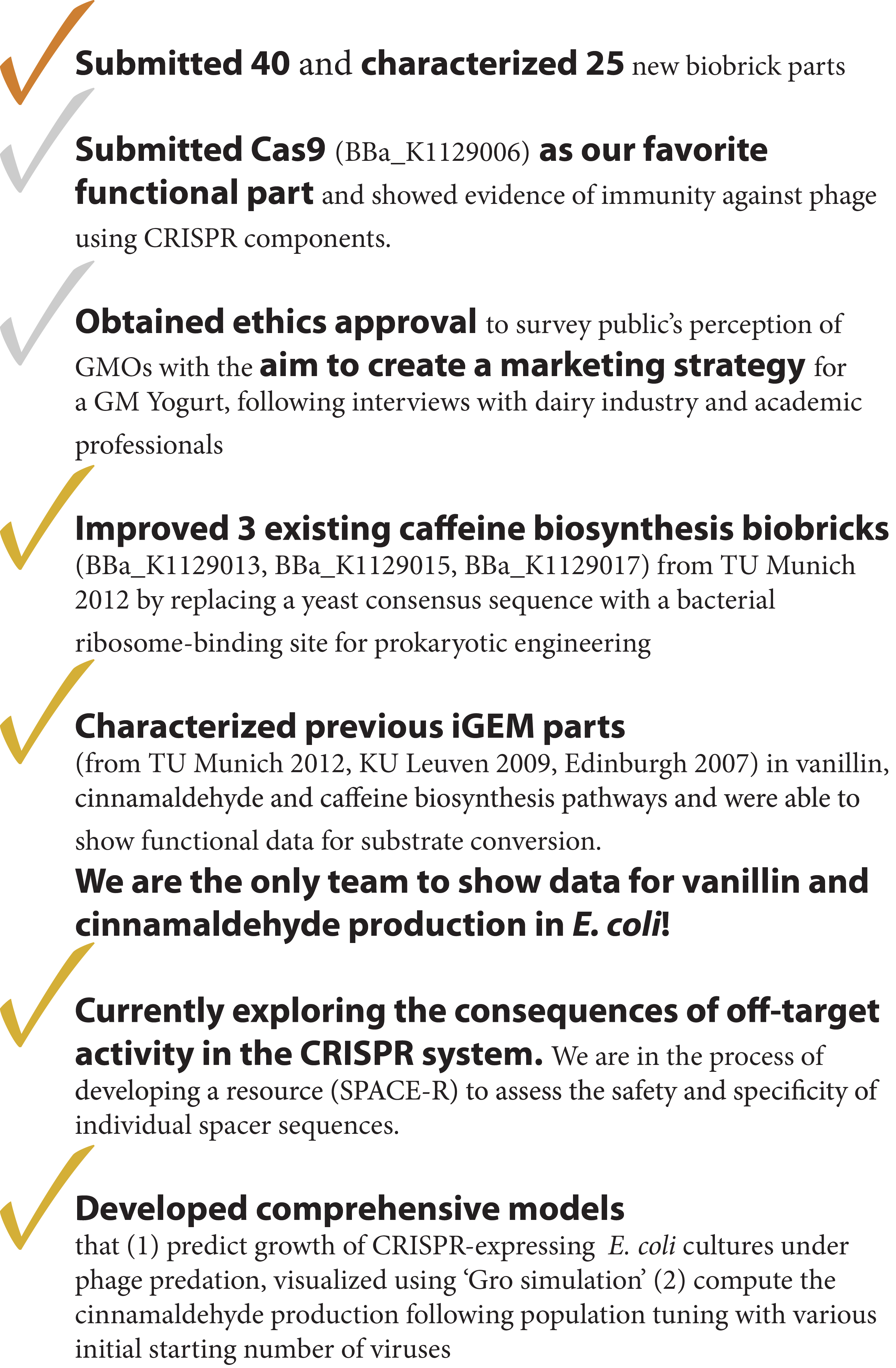Team:British Columbia/Achievements
From 2013.igem.org
(Difference between revisions)
(→Medal requirements) |
|||
| Line 89: | Line 89: | ||
<ul class="g"> | <ul class="g"> | ||
<li>Improved 3 existing caffeine biosynthesis biobricks (<a href="http://parts.igem.org/wiki/index.php?title=Part:BBa_K1129013"> BBa_K1129013 </a>, <a href="http://parts.igem.org/wiki/index.php?title=Part:BBa_K1129015"> BBa_K1129015</a>, <a href="http://parts.igem.org/wiki/index.php?title=Part:BBa_K1129017"> BBa_K1129017</a>) from TU Munich 2012 by replacing a yeast consensus sequence with a bacterial ribosome-binding site for prokaryotic engineering</li> | <li>Improved 3 existing caffeine biosynthesis biobricks (<a href="http://parts.igem.org/wiki/index.php?title=Part:BBa_K1129013"> BBa_K1129013 </a>, <a href="http://parts.igem.org/wiki/index.php?title=Part:BBa_K1129015"> BBa_K1129015</a>, <a href="http://parts.igem.org/wiki/index.php?title=Part:BBa_K1129017"> BBa_K1129017</a>) from TU Munich 2012 by replacing a yeast consensus sequence with a bacterial ribosome-binding site for prokaryotic engineering</li> | ||
| - | <li>Characterized previous iGEM parts | + | <li>Characterized previous iGEM parts (from <a href="https://2012.igem.org/Team:LMU-Munich"> TU Munich 2012</a>, <a href="https://2009.igem.org/Team:KULeuven/Project">KU Leuven 2009</a>, <a href="https://2007.igem.org/Edinburgh"?Edinburgh 2007</a>) in <a href="https://2013.igem.org/Team:British_Columbia/Project/Vanillin">vanillin</a>, <a href="https://2013.igem.org/Team:British_Columbia/Project/Cinnamaldehyde">cinnamaldehyde</a> and <a href="https://2013.igem.org/Team:British_Columbia/Project/Caffeine">caffeine</a> biosynthesis pathways and were able to show functional data for substrate conversion. We are the only team to show data for vanillin and cinnamaldehyde production in E. coli!</li> |
| - | (from TU Munich 2012, KU Leuven 2009, Edinburgh 2007) in vanillin, cinnamaldehyde and caffeine biosynthesis pathways and were able to show functional data for substrate conversion. We are the only team to show data for vanillin and cinnamaldehyde production in E. coli!</li> | + | |
<li>Currently exploring the consequences of off-target activity in the CRISPR system. We are in the process of developing a resource (SPACE-R) to assess the safety and specificity of individual spacer sequences.</li> | <li>Currently exploring the consequences of off-target activity in the CRISPR system. We are in the process of developing a resource (SPACE-R) to assess the safety and specificity of individual spacer sequences.</li> | ||
<li>Developed comprehensive models that (1) predict growth of CRISPR-expressing E. coli cultures under phage predation, visualized using ‘Gro simulation’ (2) compute the cinnamaldehyde production following population tuning with various initial starting number of viruses</li> | <li>Developed comprehensive models that (1) predict growth of CRISPR-expressing E. coli cultures under phage predation, visualized using ‘Gro simulation’ (2) compute the cinnamaldehyde production following population tuning with various initial starting number of viruses</li> | ||
Revision as of 03:46, 29 October 2013
iGEM Home


Achievements

- Won the trophy for Best Model at the iGEM North America Jamboree in Toronto
- Advanced to the iGEM final Jamboree at MIT with gold medal status
- Produced a functional cinnamaldehyde biosynthetic pathway in E. coli starting from phenyalanine
- Produced a functional vanillin biosynthetic pathway in E. coli starting from p-coumaric acid
- Biobricked Cas9, showed expression and began to characterize it's activity E. coli
Medal requirements
- Submitted 40 and characterized 25 new biobrick parts
- Submitted Cas9 (BBa_K1129006) as our favorite functional part and showed evidence of immunity against phage using CRISPR components.
- Obtained ethics approval to survey public’s perception of GMOs with the aim to create a marketing strategy for a GM Yogurt, following interviews with dairy industry and academic professionals
- Improved 3 existing caffeine biosynthesis biobricks ( BBa_K1129013 , BBa_K1129015, BBa_K1129017) from TU Munich 2012 by replacing a yeast consensus sequence with a bacterial ribosome-binding site for prokaryotic engineering
- Characterized previous iGEM parts (from TU Munich 2012, KU Leuven 2009, ) in vanillin, cinnamaldehyde and caffeine biosynthesis pathways and were able to show functional data for substrate conversion. We are the only team to show data for vanillin and cinnamaldehyde production in E. coli!
- Currently exploring the consequences of off-target activity in the CRISPR system. We are in the process of developing a resource (SPACE-R) to assess the safety and specificity of individual spacer sequences.
- Developed comprehensive models that (1) predict growth of CRISPR-expressing E. coli cultures under phage predation, visualized using ‘Gro simulation’ (2) compute the cinnamaldehyde production following population tuning with various initial starting number of viruses
 "
"
